Research Articles and Book Chapters
Coticchia, F., & Di Giulio, M. (2024). What makes paradigms last? A study of defense policy change in Germany and Italy (1989–2022). Journal of European Public Policy, 1–30
Abstract
Policy ideas are often crafted in international fora, such as international organisations, multilateral institutions, and high-level summits. However, whether and how ideas will eventually inform policymakers at the domestic level remains an understudied subject. This paper contributes to this debate by tracing the domestic consolidation and eventual erosion of ‘Crisis Management’, a policy paradigm that emerged after the end of the Cold War and became dominant among NATO members in the 2010s. We investigate Germany and Italy as two case studies that followed two distinct trajectories. Policy elites suddenly adopted the paradigm in Italy and built a broad consensus on it. In Germany, crisis management has emerged lately and remains contested, as the territorial defense has maintained legitimacy among elites. Understanding the mechanisms underpinning such trajectories is the key to uncovering whether a consensus on a new version of territorial defense as a dominant paradigm will consolidate.
Vignoli, V., & Coticchia, F. (2024). The politics of military assistance: Italian parties’ positions on the war in Ukraine. South European Society and Politics, 1–25.
Abstract
In recent years, a research agenda on the party politics of military interventions has flourished. However, considerably less attention has been devoted to analysing party positions on the decision to provide military assistance to an actor involved in the conflict. This article focuses on Italy’s support for Ukraine after the 2022 Russian invasion. Triangulating quantitative and qualitative data, we examine party positions and how they evolved from the Draghi to the Meloni government. We find that moderate parties have generally been more supportive than extreme parties except Brothers of Italy, whose stance is still coherent with its own peculiar core values.
Coticchia, F., & Mazziotti di Celso, M. (2024). Still on the same path? Italian foreign and defence policy in the Enlarged Mediterranean. Mediterranean Politics, 1–10
Abstract
What is the vital strategic area for Italian foreign and defence policy? As a G-7 member and prominent contributor to international security with leading roles in NATO, UN and EU missions, Italy’s regional and global outlook deserves specific attention. For years, Italian governments have attributed relevance to the ‘Enlarged Mediterranean’ (EM) as a crucial region for protecting and promoting national interests. Yet, after Russia’s invasion of Ukraine and the rising strategic competition in Asia, some authors have observed a significant expansion of Italy’s foreign and defence policy towards Eastern Europe and the Indo-Pacific. Thus, one might question whether the strategic significance of the EM for Italy has diminished due to the growing political, economic, and military engagement in other regions. Despite the above-mentioned novelties, this paper argues that ‘Enlarged Mediterranean’ still represents the most relevant ‘path’ for Italian foreign and defence policy. Relying on secondary and primary sources (interviews with Ministers, Undersecretaries, MPs, Generals, and experts; official documents; etc.), the manuscript assesses our claim, paving the way for further broader reflection on the future of Italian (and European) foreign policy.
Op-eds and others
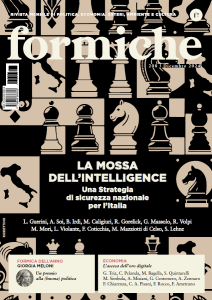 Coticchia, F., & Mazziotti di Celso, M. (2024). Ricette (utili) internazionali. Formiche, 208, 28-31
Coticchia, F., & Mazziotti di Celso, M. (2024). Ricette (utili) internazionali. Formiche, 208, 28-31
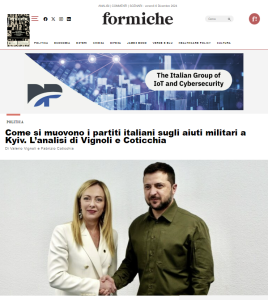 Vignoli, V., & Coticchia, F., (2024, December 6). Come si muovono i partiti italiani sugli aiuti militari a Kyiv. L’analisi di Vignoli e Coticchia. Formiche.
Vignoli, V., & Coticchia, F., (2024, December 6). Come si muovono i partiti italiani sugli aiuti militari a Kyiv. L’analisi di Vignoli e Coticchia. Formiche.
 Mazziotti di Celso, M., & Natalizia, G. (2024, February 2). Cosa c’è dietro la tentazione dell’Italia di proiettarsi in Oriente. Formiche.
Mazziotti di Celso, M., & Natalizia, G. (2024, February 2). Cosa c’è dietro la tentazione dell’Italia di proiettarsi in Oriente. Formiche.
Research Articles and Book Chapters
Baroncelli, E., & Irrera, D. (2024). The Triple Nexus and the Future of Multilateral Governance: Rethinking Coordination between Humanitarian, Development and Peacebuilding Efforts. The International Spectator, 59(3), 1–20.
Abstract
The UN-orchestrated Triple Nexus – a multilateral endeavour to provide humanitarian-development-peace responses in fragile and conflict-affected contexts – embodies several features of the emerging trend towards governance through regime complexity. Praised for its multi-actorness inclusivity and cross-policy experimentalism, the Nexus approach has been criticised as an attempt to replicate top-down, neo-liberal templates to govern crises in the peripheries. We analyse the new evidence provided in this Special Issue, connecting it to the debate on the future of multilateral governance, against the decline of the Liberal International Order (LIO). Guarding against naïve expectations of the Nexus as a panacea to bridge cross-policy gaps and bring about inter-agency cooperation amidst increased geopolitical tensions, we discuss its potential to become a venue for an enlarged conversation among traditional and new players. While also compatible with pluralist scenarios, a progressive variety of the Nexus may well emerge in the UN context, between Western and Latin America and the Caribbean (LAC) players. Their shared understandings of civil and political rights offer a promising avenue to advance some forward-looking Nexus components, supportive of individual and nature-based rights, to govern the increased complexity of the current multiplex order.
Op-eds and others
Research Articles and Book Chapters
Carrieri L., Guidi M., Olmastroni F. (2023) “Politici vs. pubblico: posizionamento e congruenza sui temi in agenda”. In Isernia, Pierangelo, Martini, Sergio, Luca Verzichelli (eds.), La classe politica italiana: Struttura, atteggiamenti, sfide. Bologna: il Mulino.
Isernia P, Martini S, Olmastroni F, Verzichelli L. The Italian political class: two multilevel datasets on the profiles and opinions of elected politicians. Italian Political Science Review/Rivista Italiana di Scienza Politica. Published online 2024:1-11. doi:10.1017/ipo.2024.17
Abstract
The datasets on the Italian political class provides two sets of information: (a) census data on a broad spectrum of individual-level variables on elected politicians, offering an updated mapping of the characteristics of more than 20,000 Italian representatives at all governmental levels; (b) survey data on politicians’ attitudes towards elections, participation, public opinion, several national and international policy issues, and their views of political representation. Between September 2020 and January 2021, 2134 elected politicians at the local (n = 1917), regional (n = 128), national (n = 75) and European (n = 14) levels were interviewed, making this one of the largest surveys of the Italian political elites ever conducted and a valuable resource for researchers interested in the study of democratic representation.
Borri R., Isernia P., Mingardi C., Olmastroni F. (2024). “European Public Opinion on the Challenges and Future of EU Foreign and Security Policy”, JOINT Research Papers No. 23, January.
Abstract
The present report illustrates the results of a survey conducted in six European countries (France, Germany, Greece, Italy, Poland and Spain) to assess public sentiments towards EU Foreign and Security Policy (EUFSP). Notably, the survey reveals a strong demand for more EUFSP, with a majority supporting a move away from the unanimity rule toward majority voting. Although there is support for greater defence capacities at the EU level, the majority remains unwilling to relinquish national armies for a unified force. The context of the Russia-Ukraine war introduces potential dissonance: majorities in most countries express
readiness to support Ukraine, but differences in support levels and approaches emerge, particularly in Greece and Italy. The survey suggests that while conditions for a more integrated EUFSP exist, political elites need to articulate a persuasive argument for rebalancing the relationship between member states and the EU in foreign and defence matters in favour of the Union. The study acknowledges the possibility of public opinion shifting in the face of politicisation, leaving open questions for future research efforts


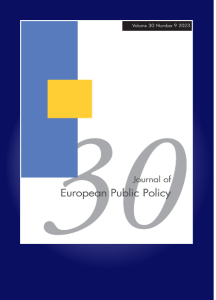
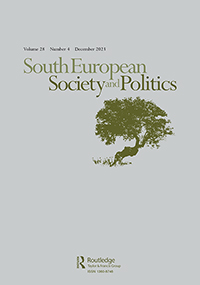


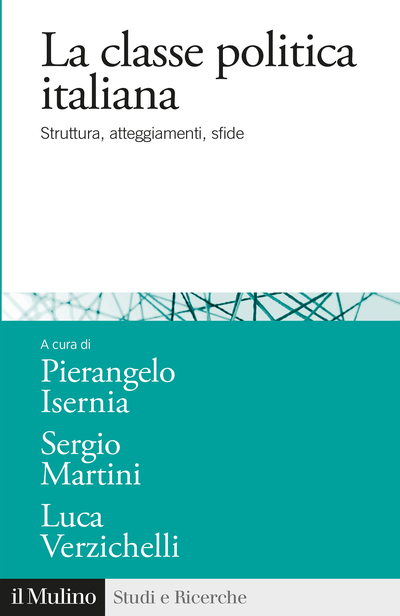
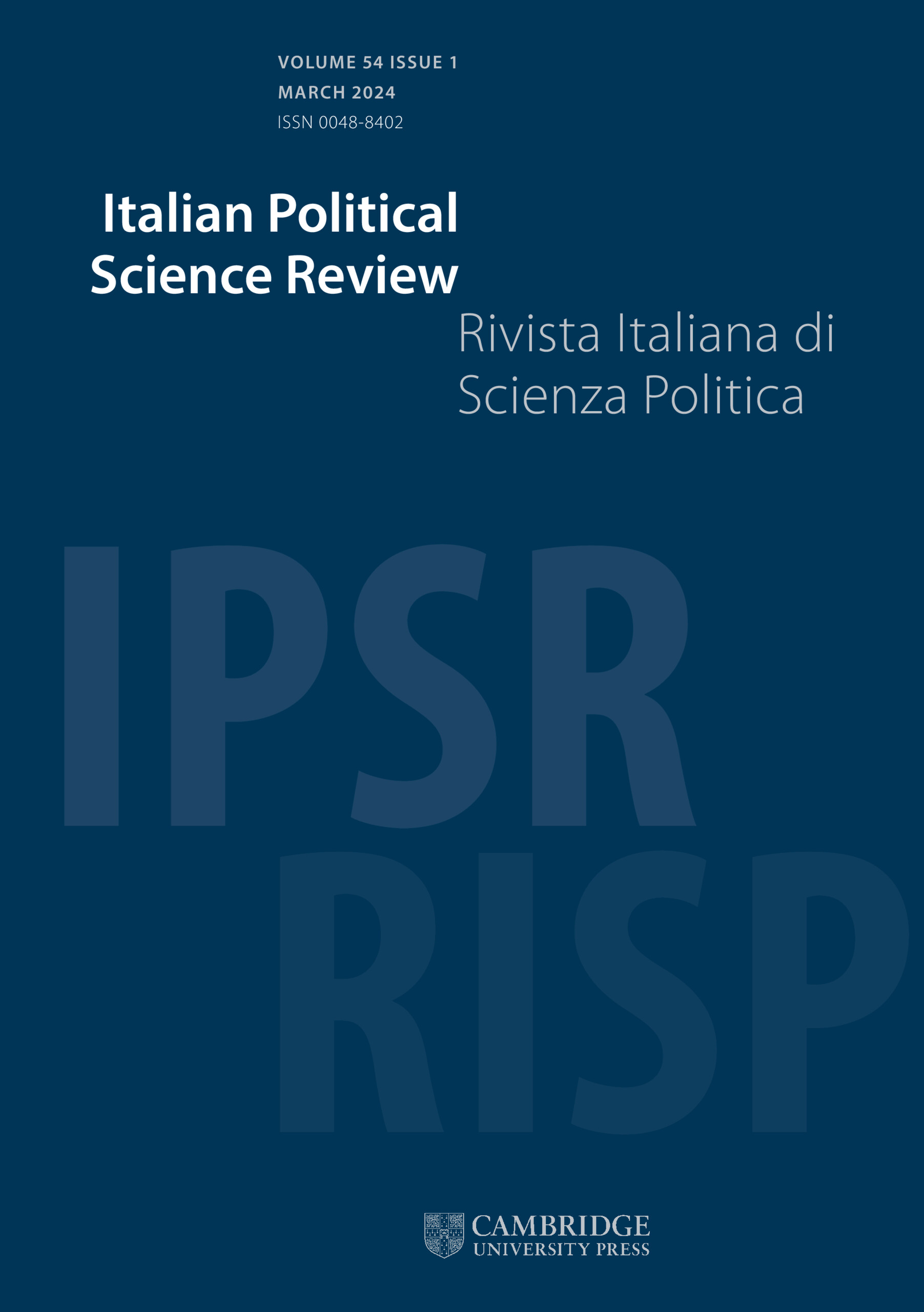 Research Article
Research Article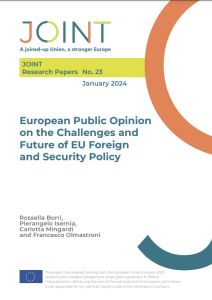 Research Article
Research Article